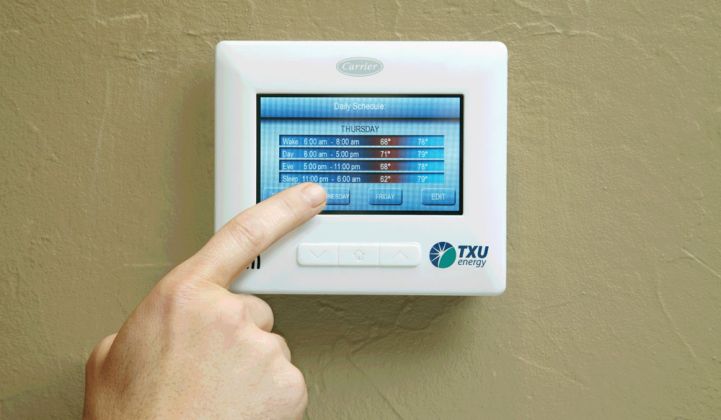TXU Energy was one of the first energy retailers to offer a smart thermostat program, way back in 2009.
The Texas retailer has now chosen EnergyHub to manage those thermostats, which number in the tens of thousands, according to EnergyHub.
The iThermostat program will now come with location-based controls, via which customers can set their thermostats to adjust as a mobile device leaves or returns to the house. The system works so that multiple devices are all connected.
For the past five years, Comverge was the platform provider for TXU’s iThermostat program. Recently, however, TXU has been looking to increase its offerings in the competitive landscape of Texas electricity companies.
Last month, TXU chose Bidgely to power its energy engagement solution, which is offered to the utility's 1.5 million residential customers. In the past, TXU had used a homegrown solution.
EnergyHub scored another small win this week, this time with another early leader in varied residential energy offerings: Salt River Project.
Salt River Project is arguably one of the most successful utilities in the domains of time-of-use pricing, prepay plans and overall customer satisfaction. Most customers on the EZ3 rate plan, under which prices can jump up to more than $0.30 cents per kilowatt-hour in the blazing Arizona summer, already save money versus those on a flat-rate plan.
With its new EnergyHub pilot, Salt River Project will see if 250 customers can save even more than the average 6 percent with the help of a smart thermostat. The pilot is part of a larger research project being undertaken with the Electric Power Research Institute and other utilities. If successful, the pilot could bolster the confidence of other utilities when it comes to offering smart thermostat rebates for customers on time-of-use rate plans.
If you’re thinking that the concept of running a pilot to determine whether smart thermostats can save energy seems a bit dated, well, it is. But for many utilities, especially those that need to seek public utility commission approval for every move they make, there is an endless appetite for piloting technologies that are already being used successfully by other utilities.
Those utilities that have stepped it up with more ambitious approaches are often finding success. Comverge and Pepco Maryland recently announced that about half of their customers (that is, more than 360,000) have signed up for Energy Wise Rewards. The program, which includes direct load control and smart thermostats, has more than doubled in size in the past two years and controls about 300 megawatts.
The growth of and continued interest in smart thermostat programs is evidence that even with the current and emerging legal challenges facing the larger demand response market, both regulated and deregulated utilities are looking for options to deepen their relationships with their customers and tap homes for meaningful peak reduction in summers.



